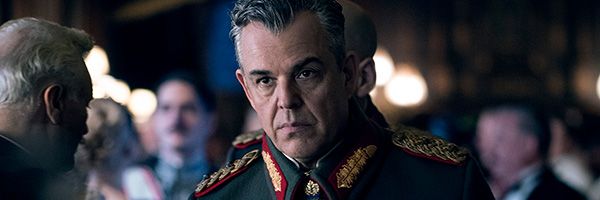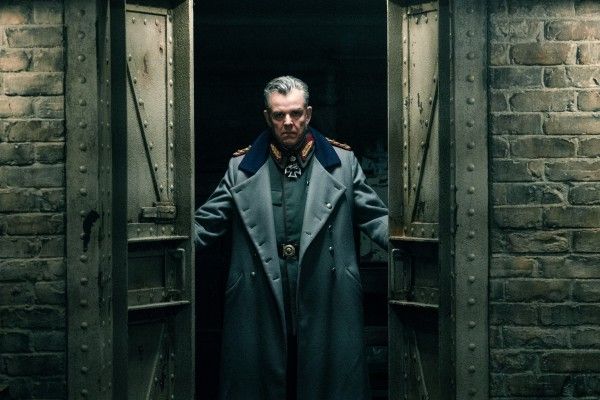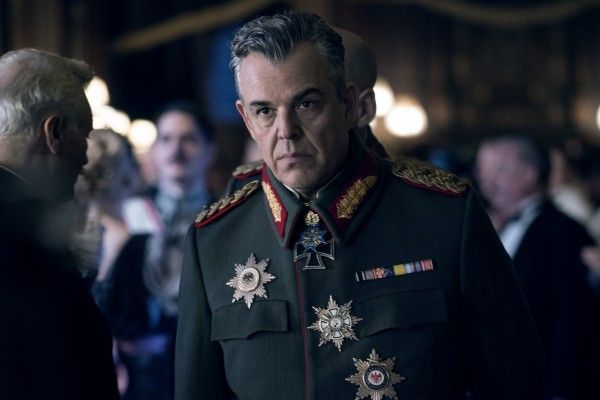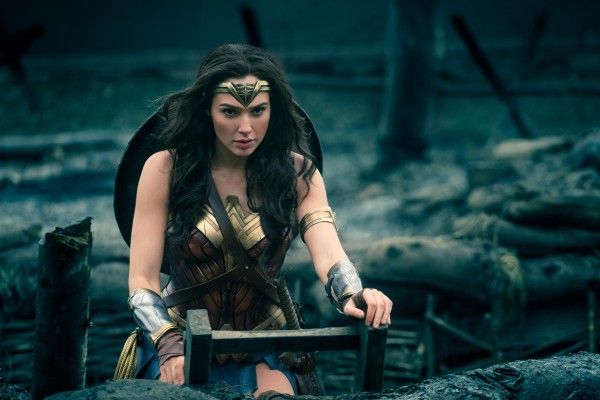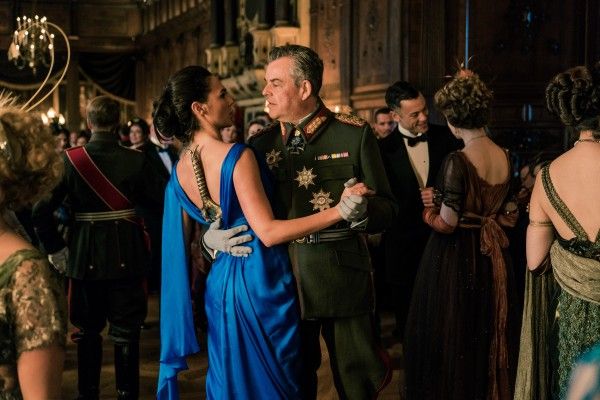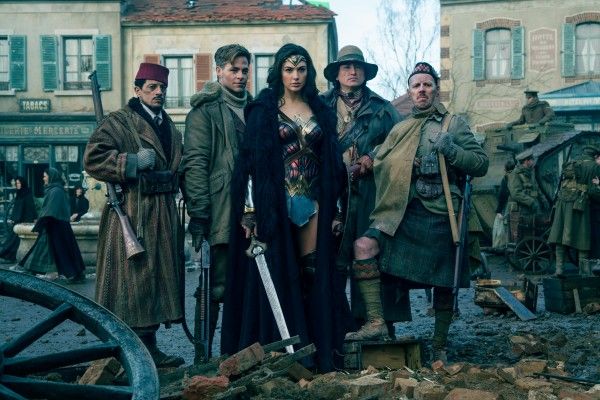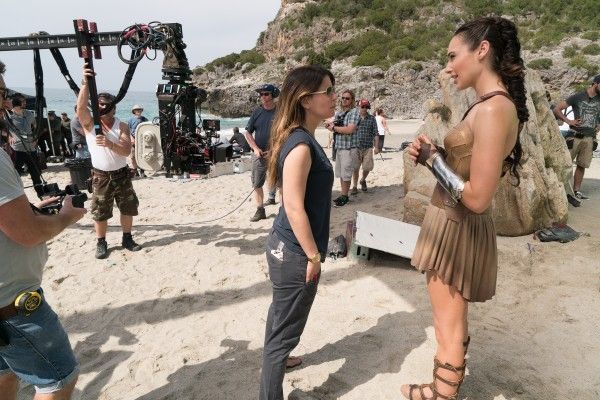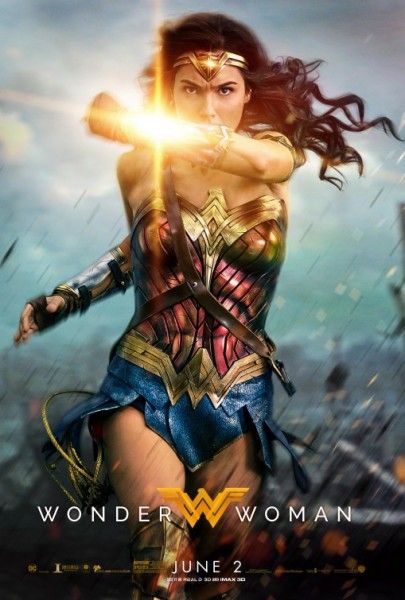A few days before Patty Jenkin’s Wonder Woman was in theaters, I sat down with Danny Huston for an exclusive interview. During our wide-ranging conversation he talked about how he got involved in the project, if he was a fan of the superhero genre, how Jenkins pitched him on playing General Erich Ludendorff, memorable moments from filming, and the way he likes to work on set. In addition, he talked about directing The Last Photograph, what he learned from his father (John Huston) about directing, playing Hal Roach in Stan and Ollie opposite Steve Coogan and John C. Reilly, and a lot more.
Check out what he had to say below. Written by Allan Heinberg with a story by Zack Snyder & Heinberg and Jason Fuchs, Wonder Woman stars Gal Gadot, Chris Pine, David Thewlis, Robin Wright, Connie Nielsen, Ewen Bremner, Lucy Davis, Lisa Loven Kongsli, Eugene Brave Rock, and Saïd Taghmaoui.
Collider: The superhero genre is the most popular genre on the planet. Had you been approached, or had you been interested in doing a superhero movie prior to this one. How did this come about for you?
DANNY HUSTON: I wasn't. I was in London, I was editing a film that I just finished directing and I got a call that Patty Jenkins wanted to meet me, she's making Wonder Woman. I had dinner with her a good hour and a half, two hour dinner and she told me the story. Then she brought up General Ludendorff, looked him up and she showed me some photographs that sort of down turned mouth that he has, and sort of stubborn arrogance and we delved in a little bit more, as far as who he is and was as I said he was a General in the first World War. A pragmatist, realist, patriotic, fighting for his country, he lost his son on the German front lines and was just quite tortured, diabolical, stubborn and believes that what he's doing is for the betterment of mankind.
Like all good villains.
HUSTON: Yeah, and the interesting angle that she had in regards to Ludendorff is that through the eyes of this demigod Wonder Woman, belongs to Greek Mythology we examine mankind and mankind's weaknesses. Ludendorff is a believer that war is a natural habitat for humans, and in that sense it's a little bit of a cautionary tale and Greek Mythology works in those terms in so far as being able to examine what we are and what we're about, and what our weaknesses are and the danger of war. I think this is an anti-war film, and somebody like Ludendorff would probably think that the idea that love conquers all is quite a naïve concept. But finally it's true and sometimes the best way to examine mankind is from another perspective, and that's where Greek Mythology works.
Had you seen a lot of the comic book movies prior to getting involved in Wonder Woman, were you a fan of the genre?
HUSTON: I'm a fan of the genre, but I wasn't really that knowledgeable in regards to Wonder Woman. I knew the theme and I had some sort of memory of the lasso and the invisible airplane, which we don't have in this version but Patty Jenkins was very committed to giving this a sense of realism in regards to mankind, human nature. Even though we were entering through a fantastical world.
When you think back on the making of the film, is there a day or two that you will always remember, memorable moments from filming?
HUSTON: Well yeah, I was very nervous about waltzing with Gal Gadot because I wanted to impress her. I wanted to impress her as Wonder Woman, and I wanted to impress Gal as well. So that was a nerve-wracking day for me, because not only did I want to impress her, but I also wanted to remember my lines. I didn't want to disappoint anybody, but I certainly wanted to impress Gal and I did my best. After a few takes, I was like a fighter in the sort of 10th round, literally hanging on her neck and she managed to keep me upright and looking powerful. But that in a way was my most challenging day.
Concerning your work as an actor: some actors prefer to film the rehearsal, do the Clint Eastwood method, filming the rehearsal, do two takes, we're done. And others really enjoy the David Fincher method of 50 takes, and doing it as many times as they can. How do you typically like to work?
HUSTON: Once I feel I've got it right I don't like to repeat, but sometimes it takes me a long time to get there, and sometimes it doesn't. What I've discovered working with quite a few directors in my career now that there really are no rules. There is no one way to achieve something and you are as an actor, stepping into the vision of the director, and there to serve that vision. Things that you might think of as obstacles, you try to make them work to your advantage and as long as you are observant enough and not too self involved, usually you can navigate that. Every film is another world entirely, requires different part of your talent.
About Last Photograph: you hadn't directed in about 20 years, what was it about the material that said I need to make this, this is something I have to do?
HUSTON: Based on a friend of mine’s novel, Simon Astaire who offered the script, book, and the financing. That was enough to get my attention, and we made it for very little, extremely little. But it was ours to make how we wanted to make it. I say it's a rather humble film but when I say that I realize that I'm in it in close up almost from beginning to end, so maybe I shouldn't call it humble, but the making of it was. Maybe not the result.
Can you talk about what its about and what appealed to you about the story itself.
HUSTON: It's three different timelines, one of the timelines is me driving my son to the airport and the conversation we are having is quite be now as a conversation would be possible between a father and son on the way to the airport. As that story is being told and in a way that's the spine of the story, we flash forward 10 years to where this man is working in a bookshop and a photograph is stolen and we realize that the last photograph that he had with his son, and his son is about to board the Pan Am flight that was bombed over Lockerbie, the first big terrorist attacks of that size. As we realize that, we understand why he's gone insane and on the hunt for this photograph, basically that's the story.
Was it the father/son dynamic, what was it specifically that really appealed to you though?
HUSTON: This curmudgeonly man whose really not particularly nice and not communicative, who when we start to understand why and what happened to him, suddenly he becomes more endearing. The terrorist attack in reaction to an individual rather than the act itself, and how many individuals are experiencing that kind of loss. So the very personal nature of it, and how he overcomes that loss. The madness of the man too, losing this photograph, understanding he’s gone completely insane and discovering why.
When reading a script, how soon do you realize you want to play a character? Some people, they can be 3-4 pages in, and they're like “oh, this is good” and others they really need to think about it, and sometimes they over think it. When do you know you want to play a part?
HUSTON: I consider myself a storyteller, not really even an actor. I consider myself a storyteller, so it's the story for me that counts, sometimes you read a great script and your part is just not good enough, and that's when I struggle, but I really want to serve this story, I want to work with these people that I respect, it matters to me. I enjoy the read but the part doesn't quite work, do I do it or not. A lot of the times my instinct is if I respect the people involved and I like the story, well now I'll do it. I just want to be around, I want to be part of it.
You've worked with a lot of gifted directors over the last two decades, was there a day on one of these sets that you were working that you picked up some advice that's really stuck with you, or a lesson that you've learned by watching someone?
HUSTON: Well my father, I was a kid and I had this Super 8 camera and I was delighted with it and I was filming everything and my father looked at me and went “stop it, what are you doing?” “Well I'm filming with my camera.” He goes “No stop that. When you look from left to right and right to left, what do you do?” I went, “I don't know, I give up, what is it I do?” And he says, “You blink, that's a cut. Concentrate on what it is that you're trying to say, not all the nonsense in between.” It's a good life lesson, and it's a very good lesson as far as filmmaking is concerned because it really tells you where the camera goes and not to concentrate on all the messy stuff in between. If you think the way that a camera sees, the more interested I am in what you're saying, I blink and it becomes a close up. The less interested, maybe the camera will wander and move over there. Maybe sound will distract me, and need a shot there and it really does dictate how one films and it's very helpful because in a way you are editing in the camera. It's helpful because you're not wasting time on stuff that doesn't matter.
I definitely want to touch on Stan and Ollie, because that's something that I'm looking forward to.
HUSTON: So am I. So Steve Cougan, and John C. Reilly, they are absolutely spectacular together and with minimal prosthetic they have just become Laurel and Hardy. It's just unbelievable and its heart breaking, it's just heartwarming to see them interact the way that they do and dance and the comical timing everything is just as if you're seeing Laurel and Hardy again. I first came across Laurel and Hardy when I was in Italy as a kid and they spoke in Italian with dubs and they had these really snobby Italian accents, rather sort of ridiculous. Stallio and Ollio were their names. I remember first seeing them in English thinking oh my god what have they done, they've ruined my vision of them, but it was great. A lot of fun
Are you an antagonist in the film, do you help them?
HUSTON: I'm a director, I put them together.
With a project like that, how much is that based in reality?
HUSTON: It's based in reality, but it's also quite broad. It sort of works in the realm of the films that they made and how they made them. So there's cigar smoking, pointing, big actions like that. It was quite daunting for me because this was an example of where the role... I just worked for two days on it; my role is minimal but a big part in a sense. There aren't small parts, only small actors, so it was a big part and I enjoyed it and relished it. But it's an example of me being involved in something because I believe in the project.
And also I'm sure connected with your childhood.
HUSTON: Yes. And I love John C. Reilly as well I just adore him. I worked with him on Aviator.
What’s coming up for you this year, next year, are you looking at scripts?
HUSTON: Well I just finished a play about Robert Evans on stage in London, directed by Simon McBurney who's an absolute genius, produced by Barbara Broccoli. So I play Robert Evans on stage I London, so we're talking about maybe we'll see what happens there. Doing publicity on this, and The Last Photograph is premiering in Edinburgh. So that takes me to the middle of June.

